|
When Ben Stewart was 20yrs old, he travelled to Tokyo, Japan for 6 months as a McNair Scholar and exchange student at Hosei University. For Ben, this trip would help foster a deep love for music, art and culture. What impact do you feel this trip had on you? This trip broadened my understanding of how culturally vast the world is but also how interconnected we all are. How so much of my own culture has traveled and influenced people around the world. The biggest impact that I can emphatically say is this, being abroad in a country so homogenous really help me appreciate the things I had at home, but it also helped me realize how much in excess I had. I was truly blessed. Do you feel this trip affected your sense of self or the world? Absolutely! I always tell people about my first time abroad and the one thing that never fails to get the 'WOW' response is this. I've never felt more welcomed or accepted and less judged and stereotyped then when I lived abroad in Japan. It wasn't the lack of being the exotic other but the respect of the people that truly wanted to know about me and my culture. This elevated my perception of how influential my African/African-American culture truly was. And to make these lifelong connections with people in a culture I've always respected truly bridged the idea of self and the world! "Had I not gone abroad I'm not sure I would be the person I am today." 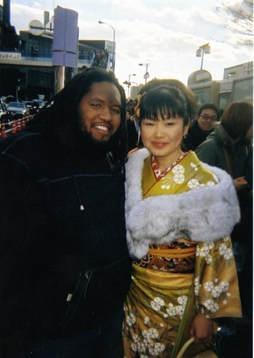 What do you think you accomplished or pursued that you otherwise would not have? I think my biggest accomplishment was learning to speak and write the language well enough to complete my research, which was later published. However, I did make a fortunate acquisition during my time there. I learned more about my own culture there, especially music, than I ever had the entire 20 years I had been on this earth. It was there that I found my true love for music, art and culture. Had I not gone abroad I'm not sure I would be the person I am today. What do you feel contributed the most to this effect? For me the openness of the people in the Japan. The way that they would literally go out of their way to assist a traveling stranger and make sure that the person wanted for nothing was truly amazing. If the adage of "it takes a village" is ever present it was in the Japanese society. And coming from a life where that was definitely abundant in my upbringing it adds to the sense of feeling more like I was at home. What advice would you give to the person you were before you took this journey? Do not let fear play a part in this adventure. You are ready for anything that comes your way, go with your gut and your heart because your mind is already prepared. 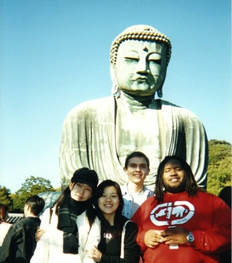 What advice would you give to the LFW team? There will always be something unforeseen ahead, but make that a part of the adventure. It's in those moment that you truly grow in this world! Those are the memories you will draw upon the next time you feel as if the world is against your back. What, if anything, would you change about your experience? Every time I get hear this question I respond the same way.... I would have stayed much longer than I did. I would have also prepared better and saved myself a lot of stress. I can't tell you how important it is to really have your affairs in order before you ever set foot abroad. You cannot plan to much! 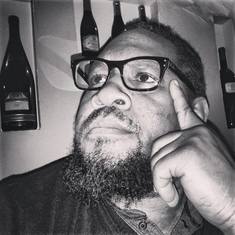 Ben Stewart is an Advisory Board Member for Leaders of the Free World. Ben graduated from Truman State University in 2005. Upon finishing his degree Benjamin moved to New York City where he went on to obtain a MBA in International Business Management from Keller Graduate School of Business and is currently finishing his second masters in Ethnomusicology at Hunter College of the City University of New York. He currently works for the Kingsborough Community College as the Sr. Academic Advisor for second year students in STEM majors. You can follow Ben on Twitter at @4matastudio and on Instagram at @benzilla06 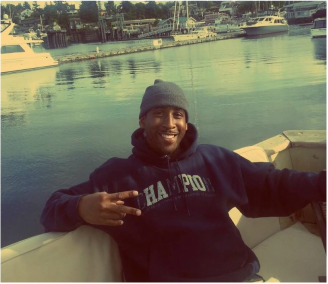 Joseph "Joey" Peele, was 16 when he had his first international experience. As Joey describes, this experience changed the way he saw and connected to those around him and instilled in him a deep appreciation for travel and other cultures. Current Age: 33 Age at the time of travel: 16 Where did you go? A cruise to The Bahamas Why was this trip meaningful to you? Growing up, my parents never took our family on a vacation together. My father became disabled when I was six years old. Over the next 10 years his condition worsened each year. When my father fell terminally ill, he told my mother that his only regret was that we never took a family vacation. My father passed in May 2000, just a couple of months after we uprooted him from his life-long home in Washington, NC to follow my mother's upward career move to better support our family. After my father's passing, she huddled my brother and I together, and decided that the first thing we would do as a family would be to take our first family vacation to honor my father. That November, we flew into Miami (my first flight ever!) to board our first Carnival cruise to The Bahamas. At the time, flying was perhaps my biggest fear, so in order to be with the family, I had to conquer my biggest fear. I know my father would have wanted me to be brave. He fought in Vietnam and is considered a war hero by his fellow soldiers, so to me, I had large expectations to fill. I know the Bahamas isn't a major international trip, but for me and my family, it was a huge turning point in our lives. What impact do you feel this trip had on you? This trip was full of so many firsts for me (flying, learning about a passport, family vacay, and many more). This trip also came right on the heels of moving to a new town and a new high school midway through my junior year, and losing my father 6 months later, then transferring to my 3rd high school for my senior year. My life was at a crossroads and life could have gone in any number of ways and I’m thankful that I had someone in my corner that knew there was a world so much bigger than myself outside of North Carolina as I was witnessing first-hand just how fragile, precious, and short, life really is. Subconsciously, this trip was slowly shifting how I value human relationships. 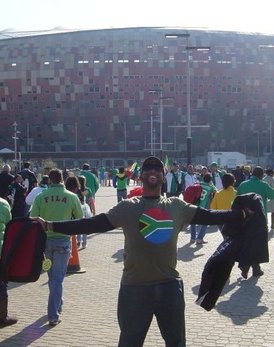 How do you think this trip effected your sense of self or the world? The exposure I got from this trip really changed my perception of people, culture, how other people viewed me, but yet how small my life actually was in comparison to the whole world. Geographically, I had no idea where the Bahamas even was on the map. At the time of this trip, I was a high school athlete with a handsome smile. I often felt as if the world revolved around me and everyone else was just a movie extra in my blockbuster. Whew, boy, was I wrong! Subconsciously, this trip was slowly shifting how I value human relationships. I became fascinated with other cultures, while developing an extraordinary passion to just explore more of the world. It seemed as if we had fell into a whole new dimension, and a whole new way of life, where I was no longer the main character. No one knew who me, my mother, or my brother were, nor did they care. I learned that people are people everywhere you go, and how you treat people will often dictate how you are treated. It also showed me how meeting and making deep connections with people through your travels can unlock so many keys to new doors you never knew were right in front of you. Everyone comes from somewhere different, everyone has a unique story, all cultures have a history. Once you allow yourself to open your mind, be courageous, and challenge your status quo, you will find benefits for your life and your work. This could even mean be by travelling outside of your city and striking up a conversation with someone you've never met before. Some of the people we met on that very cruise are still friends of our family to this day. 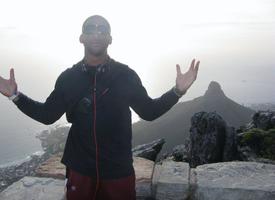 What other trips have you taken? Now, I can say that I have been on three trips to France, Germany, Austria, Switzerland, The Netherlands, Spain, Belgium, Canada three times, South Africa twice, Mexico, and The United Arab Emirates. As I have gotten older, I strongly feel that going outside of the major cities gives you a more authentic feel and a more palatable taste of a country's flavor than that of the inner cities. What advice would you give to the person you were before you took this journey? Dream your biggest. Be your greatest. I would also encourage myself to be present in every experience and opportunity. Being present can change your life, and it's incredibly simple. Learn it, practice it, be it. What, if anything, would you change about your experience? The thing I would change about my first few experiences would be to invent camera phones! I would have loved to save and cherish more of those memories from my first experiences. I am sure there are many a stories that have since faded from my memory that I desperately wish I could have back. Now I utilize my cell phone camera and dSLR camera to photo journal and video each journey to make sure I don't lose the lessons I've learned or the friends I've made along the way. About Joey: Joey is a native son of North Carolina (Beaufort and Halifax Counties respectively). Joey holds a B.S. degree in Journalism & Mass Communications with a concentration in Public Relations from North Carolina A&T State University. Upon graduation, Joey worked at the NC General Assembly and with the US Senate before working the with the North Carolina Public Health Foundation as the Rockingham County Catalyst for Healthy Eating and Active Living. Joey's passions are giving public service, and world travel. 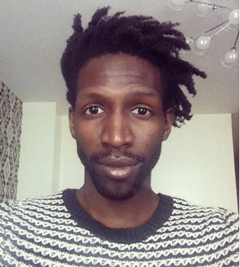 At Leaders of the Free World we are passionate about the transformative power of international travel. To that end, we are highlighting the stories of several young, Black men whose international experience had lasting impact on their lives. In some cases, these experiences spurred them to make a difference in their communities. Bashir Harrell, now 29, traveled to Japan at age 21. A trip meant to be just a few months expanded into a year: “I was selected for a semester study abroad program at Kansai Gaikokugo Daigaku (Kansai Gaidai University). After my first semester, I enjoyed the program so much I made a request to the dean to extend my stay.” “The people I met during my first time abroad were not just from Japan, but from all over the world. Many of them were there to study the language, but some had moved there long ago. I believe that meeting all these people that traveled for many different reasons from many different places essentially opened my eyes to the differences and most importantly the similarities in people of all race, creeds, and cultures.” While in Japan, Bashir was able to develop his linguistic skills. He believed his trip played a key role in this. “I truly believe that traveling to Japan was a pivotal point in my life. My time in Japan, first as a student and then as a teacher amplified my love of languages. I am happy to say that I am now proficient in Japanese, I am currently learning Mandarin, and occasionally play with French and Spanish. These are all things that I do not think I would have done if I did not make that first step.” “This trip opened my eyes to the world outside of my hometown, schools, and university community. It was a transformational experience where I was able to look back at my life and reflect on where I had been and what I had been through, while simultaneously comparing the culture of Japan to the cultural upbringing that I had in the Unites States.”Bashir’s trip made him feel that he could travel anywhere he wanted to go. “Since my first trip to Japan I traveled back there 2 more times both for stays of over a year. My curiosity of world languages and cultures propelled my graduate studies of Applied Linguistics at Teachers College, Columbia University. I believe that experiencing another culture is one of the best lessons that one can have.” “The world is your classroom. Learn everything you can from anyone who is willing to teach you. Do not be afraid of trying new things, but know yourself and understand your limits. Be true to yourself and take in everything the world has to offer. Take many pictures and keep a journal. It doesn't matter what you write, just make sure that you do.” About Bashir: The son of African storytellers, Bashir Harrell is not your average South Carolinian. Born in Georgetown, SC the second of four children, his parents named him Bashir because it means “messenger of good news”. Bashir has spent his 29 years bringing just that to everyone he meets. His life goals has lead him from South Carolina to Florida, to Japan to New York City. Now as his journey to share “good news” with the world continues as he is making plans to land in Beijing, China. Working with the Peace Corps is a travel experience like no other. Lavar Thomas, age 25, is currently serving as a Community Health Volunteer in the Western Province of Rwanda, a stay that will last a total of 27 months. Here, Lavar discusses his experiences and the lessons he's taught and learned. 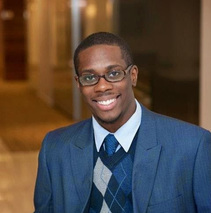 As a Peace Corps volunteer, I am confronted by children affected with malnutrition and families fighting against abysmal poverty conditions. At the local health center where I work, I attempt to address the issue of food security and malnutrition by helping to train mothers and households on creating their own kitchen garden to increase access to nutritious foods. In addition to this, I have also been able to apply my musical talent and passion, creating a song and performing it at my swearing-in ceremony, as well as utilizing my musical creativity to teach effective hygiene practices and leadership empowerment among local youth. As a health volunteer, I am tasked with weighing babies and identifying sustainable ways to address health and social issues that affect people within my village. On my commute to my health center, I encounter children who are either severely malnourished or with visibly bloated stomachs due to limited access to a consistent meal. This experience has not only been a learning experience or channel to make a difference, but also an opportunity to appreciate what I often took for granted living in the United States and living in NYC. Furthermore, as one of only two black American male volunteers currently serving in Rwanda, I recognize the need for more young men of color to have international exposure. For many people within my village, I am the first black American they have encountered. In many of my youth workshops, many of my students become confused when I speak English and present myself differently than what they see in American music videos. My presence counteracts Rwandan assumptions about what is 'American'. The perception regarding black American culture is frequently shaped by media as a result of the lack of travel by black Americans. My presence counteracts Rwandan assumptions about what is 'American'. The perception regarding black American culture is frequently shaped by media as a result of the lack of travel by black Americans. 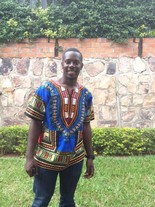 Living in Rwanda the past two years, I have recognized that for individuals living in more remote areas, to be an American means to be 'white'... the majority of the Americans they encounter, who are either doing development work or volunteering, are white. So as a black American, my very existence and visibility challenges their belief system as to what an American looks like or what it even means to be an American. Since I look like those in my environment, there is also an expectation to have greater fluency in the local language compared to my colleagues, however I find that Rwandans are more likely to feel comfortable opening up at a personal level, which is not common especially as a post conflict country. As I come to the end of my service in Rwanda, my experience as a Peace Corps volunteer has not only challenged my worldview and sense of self awareness, but also led to a greater appreciation for the relationships and for the lives that I come in contact with. The things that I took for granted such as brushing my teeth with clean water, using a toilet, or having electricity are things people in my village live without. Overall, being a part of this environment has helped me to identify what's really important in my life and lead a life of gratitude and purpose. About Lavar: Lavar is currently finishing up his 2yr Peace Corp term in Rwanda as a Community Health Volunteer. He received his B.A. in Political Science from Clark University, and is the former legislative aide to the chairman of the Public Health Committee and to the State Representative of the 15th Suffolk district in Massachusetts. (Story compiled by Elizabeth Meravi) 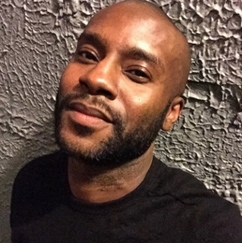 By: Philip Richardson I was 32 years-old when I took my first trip outside of the United States. I boarded an evening flight from John F. Kennedy airport — on the Indian airliner Jet Airways — which landed in Brussels the next morning, where to my surprise, signage and announcements were all made in French, Dutch, and eventually, English. Here was the Europe I had spent an entire academic life reading about. As a teenager I was self-proclaimed history-buff who enrolled in A.P. history courses well beyond the requirements needed for my high school diploma. To put it another way, I was in nerd heaven. From Brussels, I made a connection that landed in Milan, to spend two weeks with an architectural historian I befriended while doing laundry in South Brooklyn. His apartment in Bruzzano, a neighborhood in the northeast of Milan, was once a fifteenth century castle that was now converted into several apartment units. From there I purchased economy airfare to Sicily, visiting Palermo, and heading to Venice via train. My eyes were opened to the Old World when I stepped foot onto Italian soil. History permeated the Roman columns and aqueducts of Milan, the Norman castles of Palermo and the Piazza San Marco of Venice. I had stepped out of the pages of my history books, onto the very soil that cradled the feet of Julius Caesar, Napoleon Bonaparte, and Silvio Berlusconi. "It was my first personal experience with the double consciousness about which W. E. B. DuBois wrote, and so many African-American travelers speak of. I stepped into a forgetfulness that allowed me to be something more than just my race." A lot of what I experienced was familiar. Getting around Milan was easy thanks to its buses, light rail, and subway system. The very same things I use to get around in New York, Chicago or San Francisco. I ate finger food from street vendors while strolling through parks. I went to art galleries, ran into fashionistas, witnessed random quarrels between lovers, and even had breakfast at McDonald’s (although they don’t serve egg McMuffins).
For the first time in my life began to feel like a citizen of a whole world. The Italians I met were intrigued by my Americanness, and my Blackness. They were not afraid of me. My humanity was never questioned. I learned to let my guard down and truly be seen. It was my first personal experience with the double consciousness about which W. E. B. DuBois wrote, and so many African-American travelers speak of. I stepped into a forgetfulness that allowed me to be something more than just my race. It was a moment, perhaps the first, when I walked the Earth not as a black man. At least not in the vilified and adversarial ways its experienced in the United States. It’s a strange moment when you finally experience a comfort around total strangers who see you in similar ways as you see yourself. Philip is a freelance journalist, photographer and news assistant for The New York Times. He was born in Los Angeles and grew up in Dallas, Texas. A graduate of The University of Texas at Austin with a bachelor of arts degree in Africana Studies, he is currently living in New York City and is an M.A. candidate at the City University of New York, Graduate School of Journalism. 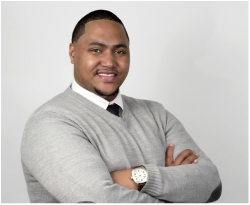 Amilton Baptista Amilton Baptista By Elizabeth Meravi At Leaders of the Free World we are passionate about the transformative power of international travel. To that end, we are highlighting the stories of several young, Black men whose international experience had lasting impact on their lives. In some cases, these experiences spurred them to make a difference in their communities. When Amilton was in college at Umass Boston, he was chosen by his Africana Studies professor to go on a trip to Cuba, sponsored by the United Nations. He had been helping his professor edit a documentary on Cuba, and jumped at this opportunity to experience the Cuban culture for himself. “This was a once in a lifetime opportunity so I knew I had to take advantage.” He and his group sailed on a replica of a Spanish slave ship from the Bahamas and up the northern coast of Cuba, visiting the seaside cities of Matanzas and Havana. Amilton says about his experience, "It made me appreciate being out of my comfort zone and having to adapt to the culture that was surrounding me.” He found that as a person of color, he experienced privilege in Cuba, whose population is about 2/3 Black and mixed-heritage. The Cuban people were warm and welcoming, in stark contrast to the negative, America-hating portrayal of Cubans that Amilton had heard from the media in the US. “I realized how much influence the media has on the way that people think.” "My trip to Cuba proved that anything was possible." Amilton also discussed what it was like to be exposed to a different value system. “The most important thing is that Cubans value humanity over materials. Although Cuba is not rich with material things they are exceedingly rich in humanity and do not fit the definition of what Americans would describe as poverty.” He saw that the Cubans valued culture: “People in Cuba appreciate culture and have many supportive programs for musicians, painters, and other arts. In Cuba, the man who teaches people how to paint on TV is a celebrity and is respected by the people.” Amilton was amazed by the architecture and art of beautiful neighborhoods in Matanzas and Havana, where there were traditional colonial buildings as well as statues and sculptures. His experience left him with a lasting appreciation for Cuban culture.
"My trip to Cuba proved that anything was possible." Since then, Amilton has gone on to live abroad in Cape Verde, Brazil, and the Dominican Republic. That first experience abroad opened the door, he says: “Had it not been for this trip I don't feel that I would've ever accomplished living in those places.” He was challenged during his trip to Cuba in ways that allowed him to grow. About Amilton: Amilton is a first generation Cape Verdean-American from Roxbury, MA. As a youth he faced much adversity and nearly dropped out of high school before realizing that an education could afford him a good life. Amilton will be joining the staff at College Bound Dorchester, helping young at-risk adult students who are in pursuit of their HISET Certificate (formerly GED) to get into and graduate from college. He's also on the advisory board and ambassador for the Bigger Than My Block Movement at www.btmb.org. 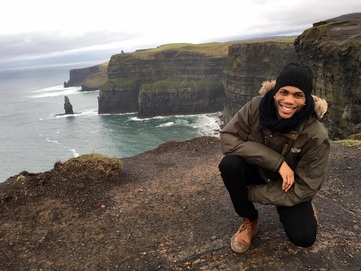 When Sean Watkins was 15, a member of the Rotary Club came to his school and told his class about a year-long Rotary Foreign Exchange Student program in Brazil. The local Rotarian chapter offered to assist any student interested in going. Having already known a few exchange students at his school, Sean felt pretty excited about the opportunity. The very next day he brought back his permission slip. "I was a new person. The experience made me evaluate my identity as an American. And how the rest of the world views America." That first year, Sean says he journaled a lot. While he enjoyed being there, he had gone alone that first year and noted that there was no one around that looked like him. "I would have liked for there to be people around like me that I could connect with." When asked how his experience was different as a person of color, he described times where it felt he had to be a "race ambassador." "The more I’ve traveled, I’ve learned that there are often many times where you will experience micro-aggressions while abroad. There was an incident once where these two European exchange students I was friends with in Brazil began to recite racist nursery rhymes. They never even know the words they used were racist, so to explain that to them while keeping my cool was a lesson I’ll never forget." When Sean returned to Brazil five years later, he was able to gain a deeper understanding of his first experience. "There were things that happened in 2006 that I didn't quite begin to understand until 5yrs later when I was able to go back in my 20’s. By this time, I learned and understood more about the racial and social history about the country." On that second visit to Brazil 5yrs later, Sean lived in Salvador, the Blackest city of Brazil, with over 80% of the population identifying as Black. Unlike the south of Brazil where he had lived, "I realized I had the privilege of 'blending in' —I looked like the people there and I spoke the language. Today, Sean has a career that allows him to travel the world; a career he says he might not otherwise have if he hadn't gone to Brazil that first time. He credits his grandmother, a dancer and singer who traveled all over the world for inspiring him. Sean credits his mother who gave him her unwavering support when he was 16, for something she knew he was passionate about; something he says he never takes for granted. "I'm grateful for those who came before me. Langston Hughes, James Baldwin, they too had the similar discoveries and wrote about them. I feel connected to them in this way and am very grateful." Sean Watkins is the Social Media Manager for OurVoices, the global campaign leg of GreenFaith. Since joining the OurVoices team a year ago, he has been integral to increasing the digital reach and engagement of the interfaith community on social media around climate action. Most recently, he has become the co-host for "Climate Voices," a podcast born out of the Paris climate talks. Before joining OurVoices, he managed editorial content and social media for an online platform designed to empower LGBTQ Christians. A graduate of Michigan State University, Sean is fluent in Portuguese and is based in Brooklyn, NY.
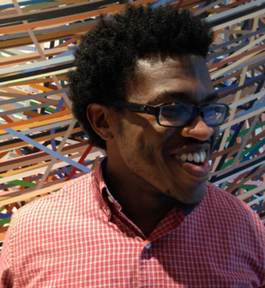 At Leaders of the Free World we are passionate about the transformative power of international travel. To that end, we are highlighting the stories of several young, Black men whose international experience had lasting impact on their lives. In some cases, these experiences spurred them to make a difference in their communities. Our first story is from Steven Hughes, Founder and Chief Financial Mentor of Know Money, Incorporated. Steven got the opportunity to travel just over this past year spending 6 days in Geneva, Switzerland at a conference. What struck him the most? “I met 450 young leaders from 160 countries with diverse experiences, backgrounds and professions. Each were brilliant in their own right and it affirmed some things for me. ” As a young, Black man from the United States, meeting so many people from so many countries was enlightening. “The opportunity to see other people of color from different countries across the globe excelling at their craft was inspiring and motivating. The media in the United States is tirelessly negative when it portrays the young black man or woman. Getting away from that and falling into many positive experiences has changed my life forever.” Steven has moved on to continue work on his own project, Know Money, Inc. to help teach financial literacy and entrepreneurship to youth and young adults across the state of South Carolina. Steven credits his experience for pushing him forward in this endeavor. "I met so many awesome people doing great things and I thought, 'I belong here. I should be doing this." He has also been bitten by the travel bug with plans to travel to Ghana, Tanzania, and Jamaica in the next year.
About Steven: Steven is a first-generation Jamaican-American and native of Columbia, SC. After making countless financial mistakes in college and rebounding from them, he has developed a passion in teaching others about financial education and entrepreneurship. For the past six years, Steven has worked with colleges, universities, organizations and companies to educate their members on reaching their financial, personal and professional goals. |
Archives
July 2020
Categories
All
|
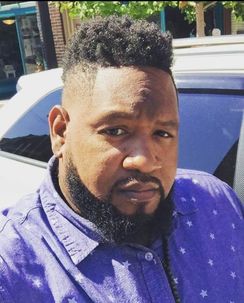
 RSS Feed
RSS Feed